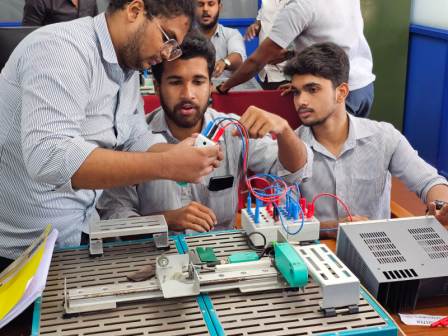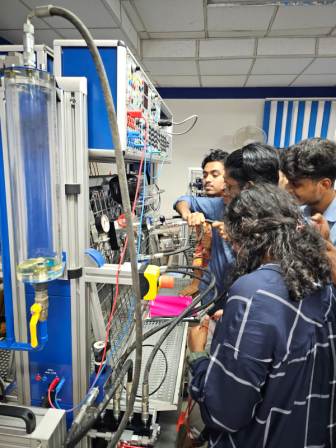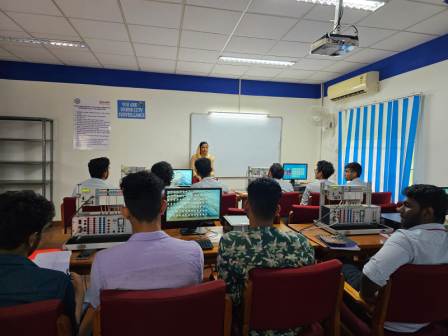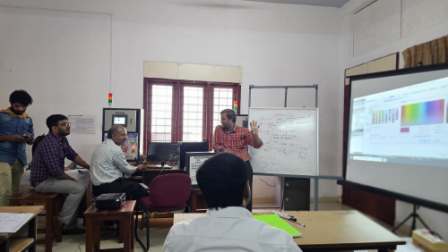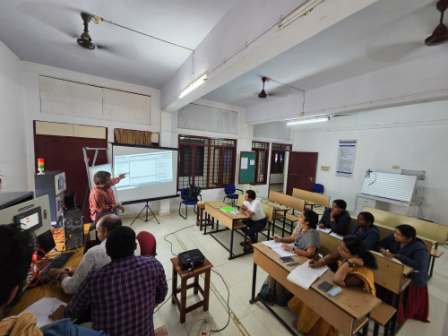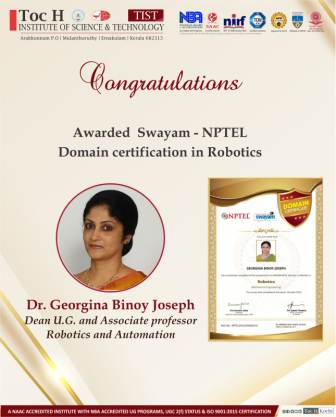SPAN – Skill Planning and AcquisitioN Cell 
The Department of Electronics and Communication Engineering has always recognized the need for upgrading the skills of students and faculty to keep up with the rapidly changing requirements of the technology industry. Various workshops have been conducted by the department keeping these technological requirements in mind. In order to bridge the gap between industry and academics, the ECE department is launching SPAN – Skill Planning and AcquisitioN Cellthat will identify and plan skill development programs according to current industrial requirements.
The objectives of this cell are to:
(i) improve employability of students by exposingthem to relevant industry standard platforms
(ii) foster in students and staff the ability to design and implement projects catering to the needs of society
(iii) facilitate students and staff to keep up with rapidly changing technologies
(iv) make learning effective and enjoyable
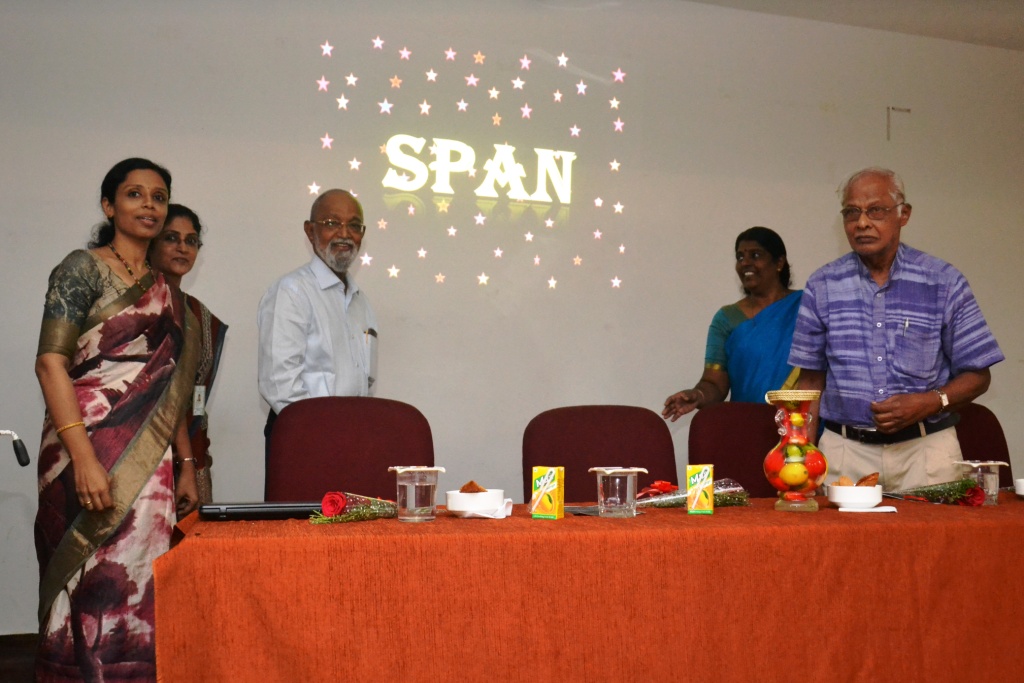
SPAN takes great pride in announcing that AICTE has acknowledged our efforts and funded our activities for the year 2021-22 under the AICTE Scheme for Promoting Interests, Creativity, and Ethics among Students (SPICES). We are very grateful to AICTE-SPICES and the Management of TIST for their support.
SPAN ACTIVITIES – ODD SEMESTER (2023-2024)
|
S. NO. |
DATE |
PROGRAM |
BATCH |
NUMBER OF STUDENTS |
|---|---|---|---|---|
|
1 |
11.9.2023 to 16.9.2023 |
Training and Internship at Bosch Rexroth-GPTCK Centre of Competence in Automation Technologies. |
S5 RA |
42 |
|
S7 RA |
46 |
TRAINING AND INTERNSHIP AT BOSCH REXROTH-GPTCK CENTRE OF COMPETENCE IN AUTOMATION TECHNOLOGIES
Bosch Rexroth – GPTCK, Centre of Competence in Automation Technologies held a training and internship for the fifth and seventh semester B.Tech Robotics and Automation students of Toc H Institute of Science and Technology from 11th September to 16th September 2023.
Topics covered in the PLC (Programmable Logic Controller) Lab included the fundamental components, software used and Bosch PLC. Circuit logic for PLC applicationslike sustained PLC circuit, lighting control and motor control were designed and tested. The training also covered fundamentals of Industrial Automation – drives, controllers, sensors. In the Sensors Lab, experiments with various sensors – inductive, capacitive, magnetic, photoelectric, etc. were conducted. Lift logic was executed on Bosch PLC – PLC circuit to move from each floor to all other floors in a 3 level lift.
Various aspects of hydraulics and pneumatics were covered. The theory and practice on hydraulic and pneumatic systems imparted practical knowledge in an effective manner. Control of extension and retraction of a cylinder was done directly and indirectly using directional control valves. In the Applications Lab, integration of all systems was described. A mini assembly line model involving hydraulics and pneumatics controlled by PLC was studied
|
S. NO. |
DATE |
PROGRAM |
Attended by |
|---|---|---|---|
SPAN Programs for TIST Faculty |
|||
|
1 |
4.1.2024 to 5.1.2024 |
Industrial Training on PLC, VFD and SCADA |
Faculty and Lab Instructors, DoE (ECE, RA) |
|
2 |
10.1.2024 |
Faculty Development Program on Texas Instruments TMS320C6748 Fixed and Floating Point DSP |
Faculty and Lab Instructors, DoE (ECE, RA) |
INDUSTRIAL TRAINING ON PLC, VFD and SCADA
A two-day Industrial Training Program on PLC, VFD and SCADA was conducted by Mr. S. Raja and Mr. Kesav of Silicon Systems, Coimbatore for the faculty of the Department of Electronics (ECE and RA).The program covered PLC hardware and programming. Ladder Logic Programming for applications targeted to Delta PLC AS218TX were developed in ISPSoft software and tested in online mode. These programs were then downloaded to the PLC to implement the application in the PLC.
Training on the Variable Frequency Drive VFD interfaced with DVP14SS2 Delta PLC was also done. Various modes by which the speed of a 3 phase induction motor could be controlled by the VFD were implemented.Interfacing of Human Machine Interface HMI with the AS218TX PLC using DoPSoft HMI Tool was also covered through various hands on applications. Lastly, SCADA software DIAView Development and DIAView Runtime were used to acquire and analyze real-time data and to control the PLC by giving various inputs.
FACULTY DEVELOPMENT PROGRAM ON TEXAS INSTRUMENTS TMS320C6748 FIXED AND FLOATING POINT DSP
An FDP was conducted to train faculty to use the TMS320C6748 DSP Processor for various applications including filtering, audio acquisition and real-time signal processing. The TMS320C6748 fixed and floating point DSP is a low-power applications processor based on C674x DSP core. Code Composer Studio which is an integrated development environment (IDE) for TI’s controllers and processors was used to develop and debug these applications.
FACULTY SKILL UPGRADATION
Faculty are encouraged to upgrade their skills and develop potential to work in cutting edge technologies through various platforms.
ARTIFICIAL INTELLIGENCE, MACHINE LEARNING, DEEP LEARNING PRIMER
Recognizing the need for incorporating Artificial Intelligence into various aspects of the learning process, a Primer on Artificial Intelligence, Machine Learning, Deep Learning for easy reference of students was developed and for final year students to enable them to prepare for projects, internships and placements. The primer is in the form of frequently asked questions FAQs and answers are given to enable the students to understand concepts and quickly prepare for viva, selection tests and interviews.
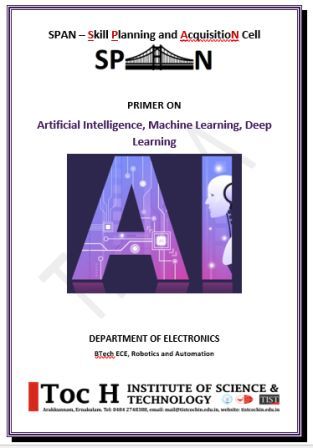
GUIDANCE FOR SKILL DEVELOPMENT THROUGH MOOC COURSES
In order to guide students in developing skills through Massive Open Online Courses MOOC, SPAN developed a plan to guide students of BTech ECE and RA to select and complete MOOC courses from the second semester to the eighth semester. The areas requiring skill development over and above the syllabus specified by the University are identified and a set of courses are suggested to students for each semester. Course selection considerations include both theoretical and practical contents of the course.
PROGRAMMING SKILLS
Recognizing that programming skills are essential to excel in any field, SPAN has taken the initiative to guide students to enhance their programming skills through self-learning. Suitable websites for tutorials in Python and Online Coding Tests were identified. Python programming was assigned for students of Semester 1 and Semester 3 and coding challenges were given to them periodically for them to understand the expectations of employers. A skill assessment test related to this will be conducted in the beginning of the next semester.
INDUSTRY PROJECTS
Skill development based on the real time industry projects is the most effective way of keeping up with fast changing technologies. SPAN gives support for skill development through industry based projects. The process for this involves identifying students for undertaking such projects through industry specific technical tests, interacting with industry for the student and project selection, preparation for technical tests and interviews, and providing technical support during the course of the project.
These projects have resulted in job offers for all four students in Centelon,IoT and Robotics wing.
S. NO. | NAME OF INDUSTRY/ORGANISATION | NAME OF STUDENT |
|---|---|---|
1 | Centelon IT Solutions LLP (IoT and Robotics), Trivandrum | 1.Adarsh VS, S7 RA 2.Gautam Sunil, S7 RA 3.JedinJebi Mathew, S7 RA 4.Justin Paul Cherian, S7 RA |
2 | SFO Technologies, NEST Group (Test and Automation) , Kochi | 1.Akshay Kannan, S7 RA 2. Aswin P Nair, S7 RA 3.Grigari T Jose, S5 RA |
3 | Telekinesis (Robotics), Germany | 1. AlikhaBalan, S5 RA |

